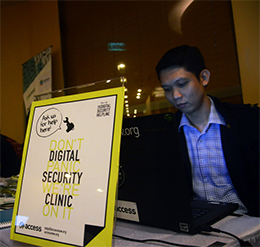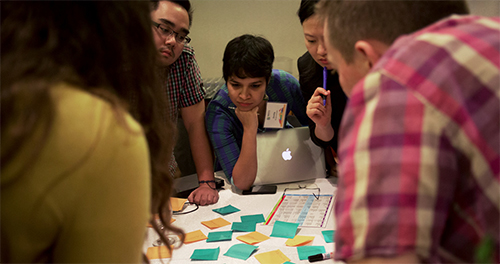This week in San Francisco, CPJ’s Technology and Advocacy teams will participate in RightsCon 2016, an annual conference focusing on human rights and technology. Organized by digital rights group Access Now, RightsCon is one of the most important regular gatherings on technology policy, and the conference has been the site of effective discussions around issues that affect journalists and journalism. We expect this year to be no different.
Part of RightsCon’s effectiveness is its dedication to fostering trust and building connections, which has created a community dedicated to better protecting the work of journalists and other at-risk groups. To foster such an environment, the conference organizers have a strong privacy policy and statement of values that set expectations around honesty, respect, and integrity at the event. (Like many other organizations, CPJ supports this approach and implemented it at its 2015 Tech Summit.) And, like the annual Internet Freedom Festival, the programming at RightsCon is largely participant-generated. This approach of community self-determination helps direct the focus on ensuring technology serves humanity.
In previous years, conversations at RightsCon resulted in the development of the Manila Principles on Intermediary Liability–a set of recommendations that CPJ supports and which act as a guide for lawmakers when setting Internet policy–as well as important steps in the development of Ranking Digital Rights, a project founded by CPJ board member Rebecca MacKinnon that documents policies of tech companies around freedom of speech and privacy.
This year, in response to the negative impact that gender-based abuse poses online and off, the program includes many sessions on gender and human rights. The technology sector is frequently criticized for being rife with misogyny, leading to the exclusion of diverse voices which, in turn, short-circuits important discussions about technology and policy. The “Gender Diversity in Tech” session at RightsCon on April 1 will look at ways to reverse that trend.
Other sessions explore the experiences that women in different regions of the world have with technology and harassment; effective responses to gender-motivated abuse; and practical solutions for combatting online trolls. The impact such abuse has on press freedom is also the focus of the 2016 edition of CPJ’s publication Attacks on the Press, which will be published April 27.

Other RightsCon events at which technology, press freedom, and social change intersect include a session on data protection challenges in countries such as Brazil, which is working out how to implement its landmark Internet legislation, the Marco Civil da Internet; discussions on how journalists have helped shed light on the disproportionate impact surveillance has on communities of color, and what this means for political organizing; and how governments in the Middle East and North Africa use anti-terror legislation to target journalists and human rights advocates. A session about the political nature of technology is especially timely amid the FBI’s legal demand that Apple create dangerous backdoors in the security of its products.
Rapid changes in technology erase borders and help people to speak freely, but they can also allow governments greater reach into lives. Journalism, like technology, can rearrange power. It can help illuminate the complex issues technology creates in nuanced and compelling ways. And it starts with sitting down with someone and listening to them.
By deliberately creating inclusive spaces, conferences like RightsCon help start that conversation.
